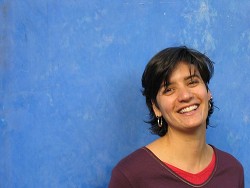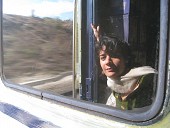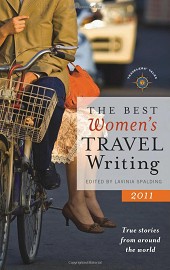Meera Subramanian writes about culture, faith and the environment for national and international publications including The New York Times, Virginia Quarterly Review, Smithsonian, orion, and others, and serves as an editor for the online literary magazine Killing the Buddha. She resides somewhere between here and there, but mostly near a Cape Cod beach these days, with frequent sojourns in search of birds of prey, skies without contrails, and animals that might eat her. You can visit her at www.meerasub.org
When did you first know you were a traveler?
When I was eight years old I packed up and left home. I traveled light, only carrying a peanut butter and honey sandwich, wrapped up and stashed in my pocket. I was on a journey-it could take hours or days, no telling-to find the headwaters of Schwenker’s Pond, the place where my brother and I caught sunnies and then threw them back in each summer and skated on thin ice each winter. I didn’t know the word headwaters back then. I just knew that the water came from somewhere-it went to the pond and I had to cross it to take the path through the woods to my elementary school-but I wanted to know where it started. I wanted to know where the water came from. So off I went to find out. I went about two and half blocks before the creek, which, by my house, you could hop over in one step and barely get your shoes soggy, dwindled into nothing. There it was. I ate my sandwich, satisfied, and returned home to pore over my stack of National Geographics, planning the next adventure.
In what ways does writing inform your relationship with travel? Do you keep a journal? Conduct interviews? Write on location?
Travel sparks my writing, as it lights up the dormant recesses of my brain and body, dispelling the routines and ruts of home. When my brain and body are alive, so is the pen. I start sketching again, the camera clicks away, and words flow in the delicious, precious, mysterious way that words do. I fill journal pages. When reporting, I am usually immersed, spending days with my subjects, entering their world, attempting to record and photograph and notetake simultaneously, and transcribe at night before the day slips away. As a result, I am usually exhausted. Secret journalistic tool: chocolate covered espresso beans.
How do you balance your home and travel life/how do you make it work to travel?

My work as a journalist is entirely based on giving myself a legitimate excuse to travel and sometimes even get paid for it. If not the recipient of an actual check covering travel expenses (it happens, but not often), at least the receipts are tax-deductible.
What advice can you give to women who want to start traveling?
In a word, wander. Uncharted territory is everywhere. If buying a round-the-world trip ticket seems a bit daunting, seek out the strange within the familiar. Find a place you’ve never been to near home and go for a day, or two, or a week. Sleep in a strange bed or pitch a tent. Take a bus or a bike even if you have a car. or come up with a scavenger hunt for yourself with hard-to-find items-an organic unfiltered gin for the perfect martini, a Rupert Holmes LP, the Indian spice asafetida (also known as devil’s dung or food of the gods)-anything that takes you to spots you don’t usually go and makes you talk to people you don’t usually talk to. And don’t use the Internet, but ask people instead. or how about this? Wander, but use explicit directions-take your second left, third right, etc.-and then enact them somewhere random and unknown. No matter how you approach it, go on your own, unless there are other human beings for whom your responsibility cannot be momentarily suspended. Then bring them along. Get out of your comfort zone. Talk to strangers.
Who is the most inspiring or interesting person you’ve met on the road?
He could have made it all up. He was a stranger, staying at the same guesthouse at Auroville in South India, an experiment in intentional living started in the Sixties and still going strong after thirty years. It was the kind of place where the children of the guesthouse owners grew up speaking seven languages, an embodiment of a world that defied borders. The stranger and I sat next to each other at the communal dinner table outside in the courtyard, the half dozen of us sharing stories of our lives.The tropical light had long ago faded by the time it came to him and and we were all shadowed in near darkness. He was European by descent, but had come to India as a baby, his father an engineer for some industrial company. And so this man, a hefty fellow in his fifties, had grown up multilingual, fluent in Hindi and other Indian languages, not unlike the children who had now been shuttled off to bed. His fair skin and opulent girth and fluent tongue made him a natural for Bollywood films, and he slipped into the industry, later helping to coordinate the filming of Gandhi as well.
But all those details of his life seemed insignificant compared to his memory of the dancing cobras. He started the story by saying it might not be true. “But this,” he said, “is what I remember.” He was just a boy, maybe five or six, and they were living in a remote location dictated by his father’s work. He was outside one day by himself when he saw two cobras not far from the house. They came together, he said, and rose up from the earth, winding the upper halves of their bodies together vertically, rhythmically, like water flowing, like scarves in the wind, wrapping around each other, intertwined. He was transfixed. He watched them for some amount of time that seemed stilled, a witness to something forbidden and unspeakably beautiful. Until the maid came out. She saw what he was watching and grabbed the boy, dragging him into the house, admonishing him severely and telling him that one should never-never-watch cobras when they are together. “They know,” she said, “and they will come after you.” Precautions were made that night. His bed raised high on blocks in his room. But they came, he said. The cobras were after him, and the next morning his mother took him on a train back into the city and he never returned to the place of the dancing cobras again.
What’s on your list of future destinations?
After a long stretch in New York City, I find myself gravitating to the most remote untouched places when I travel, often discovered through my research as a journalist who regularly writes about bird conservation. So the mythical place that I long to go to is Baffin Island, in the Arctic ocean and the Canadian territory of Nunavut, suspended in icy waters where the North American land mass breaks off into an archipelago mosaic. In summer it is a land of eternal light, and while we frolic on beaches farther south, scads of snowy owls, geese, plovers, phalaropes and red polls, beluga whales and near-mythical narwals are breathing life into their next generation. I want to go spy on the wild regeneration. I’d like to raft the Joy River, passing Mount Moore, which the Inuit called Kigaviaqsitaujaq, “the place where falcons are.” I might have to make two trips there, though, the second in the depths of winter, in order to also fulfill the longing to see the Northern Lights cascading across an Arctic sky.
In your opinion, what is the greatest reward of traveling?
Perspective, full stop. Not only do you get a glimpse of the world traveled to, but you always return to your own home and see it with new eyes.










